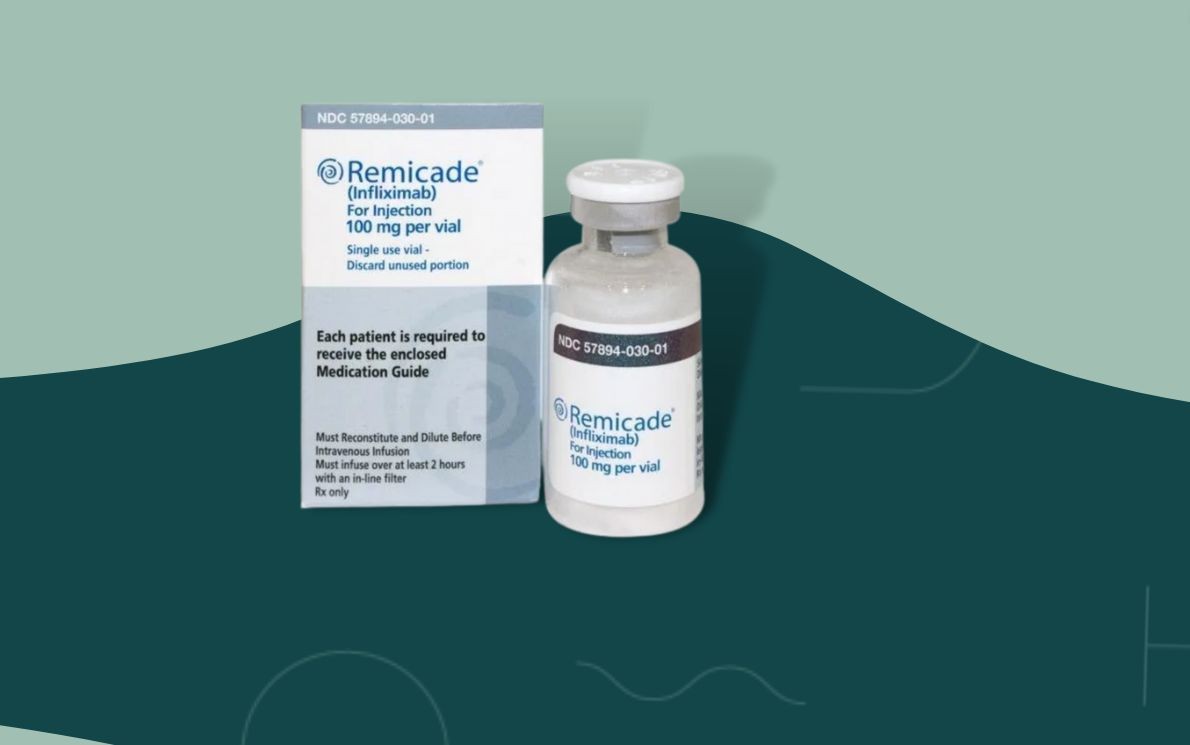
infliximab – injection, Remicade
WARNING: This medication can decrease your body’s ability to fight an infection. This effect can lead to very serious (possibly fatal) infections (e.g., fungal infections, bacterial infections including tuberculosis). You should have a tuberculosis (TB) skin test before and during treatment with this medication. Also tell your doctor your medical history, especially of past/recent/current infections. You should also tell your doctor if you have lived or traveled in areas where certain fungal infections (e.g., coccidioidomycosis, histoplasmosis) are common or if you have been near someone with tuberculosis. Areas where these types of fungal infections are commonly found include the Ohio and Mississippi River valleys and the southwestern United States. See Side Effects section for symptoms of infections to watch out for, and seek immediate medical attention if you develop any of these symptoms. The immune system is also important in preventing and controlling cancer. Though it is very unlikely to happen, there is a risk (especially in children/teens/young adults) of developing cancer (such as lymphoma, skin) due to this medication or due to your medical condition. Discuss risks and benefits of treatment with your doctor. Tell your doctor immediately if you develop symptoms such as: unusual lumps/growths, swollen glands, swollen or painful abdomen, unexplained weight loss, persistent fever or night sweats. In patients using infliximab along with azathioprine or 6-mercaptopurine for the treatment of Crohn’s disease, there have been rare reports of an extremely rare, often fatal cancer (hepatosplenic T-cell lymphoma). Tell your doctor immediately if you develop symptoms such as fever, night sweats, unusual tiredness, loss of appetite, unexplained weight loss, or swollen lymph nodes. See also Side Effects.
USES: This medication is used to treat certain types of arthritis (rheumatoid arthritis, arthritis of the spine, psoriatic arthritis), certain bowel diseases (Crohn’s disease, ulcerative colitis), and a certain severe skin disease (chronic plaque psoriasis). In these conditions, the body’s defense system (immune system) attacks healthy tissues. Infliximab works by blocking the actions of a certain natural substance (tumor necrosis factor alpha) in the body. This helps to decrease swelling (inflammation) and weaken your immune system, thereby slowing or stopping the damage from the disease.
HOW TO USE: Read the Medication Guide provided by your pharmacist before you start using infliximab and each time you get a refill. If you have any questions, consult your doctor or pharmacist. This medication is given by injection into a vein over at least 2 hours as directed by your doctor. The dosage is based on your medical condition, weight, and response to treatment. After the first dose, this medication is usually given again after 2 weeks and 6 weeks, then every 8 weeks thereafter (every 6 weeks for arthritis of the spine) or as directed by your doctor. If you are giving this medication to yourself at home, learn all preparation and usage instructions from your health care professional. Before using, check this product visually for particles or discoloration. If either is present, do not use the liquid. Learn how to store and discard medical supplies safely. Your doctor may direct you to use other medications (to help prevent side effects) before using infliximab. Use those medications exactly as directed. Use this medication regularly to get the most benefit from it. To help you remember, mark the days on the calendar when you need to receive the medication. Tell your doctor if your condition persists or worsens. SIDE EFFECTS: See also Warning section. Headache, stomach pain, or nausea may occur. If these effects persist or worsen, tell your doctor or pharmacist promptly. Remember that your doctor has prescribed this medication because he or she has judged that the benefit to you is greater than the risk of side effects. Many people using this medication do not have serious side effects. Tell your doctor right away if you have any serious side effects, including: pain/swelling at injection site, joint/muscle pain, swelling ankles/feet, easy bruising/bleeding, vision changes, seizures, confusion, muscle weakness, numbness/tingling of arms/legs, butterfly-shaped facial rash, chest pain, pain/redness/swelling of arms or legs, shortness of breath, fast/slow/irregular heartbeat. Tell your doctor immediately if you develop signs of infection while using this drug, such as: fever, chills, night sweats, persistent cough, persistent sore throat, trouble breathing, painful/frequent urination, unusual vaginal discharge, white patches in the mouth (oral thrush). This drug may rarely cause serious (possibly fatal) liver disease. Most cases occur 2 weeks to more than a year after starting infliximab. Tell your doctor immediately if you develop symptoms of liver disease, including dark urine, extreme tiredness, severe stomach/abdominal pain, or yellowing eyes/skin. A very serious allergic reaction to this drug is rare. However, get medical help right away if you notice any symptoms of a serious allergic reaction, including: rash, itching/swelling (especially of the face/tongue/throat), severe dizziness, trouble breathing, difficulty swallowing. This is not a complete list of possible side effects. If you notice other effects not listed above, contact your doctor or pharmacist. In the US -Call your doctor for medical advice about side effects. You may report side effects to FDA at 1-800-FDA-1088. In Canada – Call your doctor for medical advice about side effects. You may report side effects to Health Canada at 1-866-234-2345.
QUESTION
PRECAUTIONS: Before using infliximab, tell your doctor or pharmacist if you are allergic to it; or to mouse proteins; or if you have any other allergies. This product may contain inactive ingredients, which can cause allergic reactions or other problems. Talk to your pharmacist for more details. Before using this medication, tell your doctor or pharmacist your medical history, especially of: previous severe allergic reaction to this medication, tuberculosis (previous infection or positive skin test), past/recent/current infections (e.g., cold sores, Valley Fever), heart disease (e.g., heart failure), blood/bone marrow disorder (e.g., leukopenia, thrombocytopenia), nervous system disorder (e.g., numbness/tingling, seizures, multiple sclerosis), history of cancer (e.g., breast cancer, skin cancer, lymphoma), certain lung disorder (chronic obstructive pulmonary disease-COPD), liver disease (e.g., hepatitis B), light treatment for psoriasis (phototherapy). Before having surgery, tell your doctor or dentist about all the products you use (including prescription drugs, nonprescription drugs, and herbal products). Infliximab can make you more likely to get infections or may worsen any current infections. Therefore, wash your hands well to prevent the spread of infection. Avoid contact with people who have infections that may spread to others (such as chickenpox, measles, flu). Consult your doctor if you have been exposed to an infection or for more details. Do not have immunizations/vaccinations without the consent of your doctor. Avoid contact with people who have recently received live vaccines (such as flu vaccine inhaled through the nose). It is recommended that children get all their vaccinations before starting this medication. Older adults may be more sensitive to the side effects of this drug, especially risk for infections. During pregnancy, this medication should be used only when clearly needed. Discuss the risks and benefits with your doctor. Mothers who have used this medication during pregnancy should ask a doctor about immunizations/vaccinations for their newborn babies. It is unknown if this medication passes into breast milk. However, it is unlikely to harm a nursing infant. Consult your doctor before breast-feeding. DRUG INTERACTIONS: Drug interactions may change how your medications work or increase your risk for serious side effects. This document does not contain all possible drug interactions. Keep a list of all the products you use (including prescription/nonprescription drugs and herbal products) and share it with your doctor and pharmacist. Do not start, stop, or change the dosage of any medicines without your doctor’s approval. Some products that may interact with this drug include: other drugs that weaken the immune system/ increase the risk of infection (such as abatacept, anakinra, tofacitinib), treatment with weakened bacteria/viruses (such as live vaccines, BCG for bladder cancer).
Drugs That Slow
RA’s Progress
OVERDOSE: If overdose is suspected, contact a poison control center or emergency room immediately. US residents can call their local poison control center at 1-800-222-1222. Canada residents can call a provincial poison control center.
NOTES: Laboratory and/or medical tests (such as complete blood count, liver function test, skin exams) should be performed periodically to monitor your progress or check for side effects. Consult your doctor for more details.
MISSED DOSE: For the best possible benefit, it is important to receive each scheduled dose of this medication as directed. If you miss a dose, contact your doctor or pharmacist immediately to establish a new dosing schedule. Do not double the dose to catch up.
STORAGE: Consult the product instructions and your pharmacist for storage details. Keep all medications away from children and pets. Do not flush medications down the toilet or pour them into a drain unless instructed to do so. Properly discard this product when it is expired or no longer needed. Consult your pharmacist or local waste disposal company. MEDICAL ALERT: Your condition can cause complications in a medical emergency. For information about enrolling in MedicAlert, call 1-888-633-4298 (US) or 1-800-668-1507 (Canada).
Information last revised November 2013. Copyright(c) 2013 First Databank, Inc.
Report Problems to the Food and Drug Administration
You are encouraged to report negative side effects of prescription drugs to the FDA. Visit the FDA MedWatch website or call 1-800-FDA-1088.
Selected from data included with permission and copyrighted by First Databank, Inc. This copyrighted material has been downloaded from a licensed data provider and is not for distribution, except as may be authorized by the applicable terms of use.
CONDITIONS OF USE: The information in this database is intended to supplement the expertise and judgment of healthcare professionals. It is not intended to cover all possible uses, directions, precautions, drug interactions or adverse effects, nor should it be construed to indicate that use of a particular drug is safe, appropriate or effective for you or anyone else. A healthcare professional should be consulted before taking any drug, changing any diet or commencing or discontinuing any course of treatment.


